Huifa Li
Phenome-Wide Multi-Omics Integration Uncovers Distinct Archetypes of Human Aging
Oct 14, 2025Abstract:Aging is a highly complex and heterogeneous process that progresses at different rates across individuals, making biological age (BA) a more accurate indicator of physiological decline than chronological age. While previous studies have built aging clocks using single-omics data, they often fail to capture the full molecular complexity of human aging. In this work, we leveraged the Human Phenotype Project, a large-scale cohort of 12,000 adults aged 30--70 years, with extensive longitudinal profiling that includes clinical, behavioral, environmental, and multi-omics datasets -- spanning transcriptomics, lipidomics, metabolomics, and the microbiome. By employing advanced machine learning frameworks capable of modeling nonlinear biological dynamics, we developed and rigorously validated a multi-omics aging clock that robustly predicts diverse health outcomes and future disease risk. Unsupervised clustering of the integrated molecular profiles from multi-omics uncovered distinct biological subtypes of aging, revealing striking heterogeneity in aging trajectories and pinpointing pathway-specific alterations associated with different aging patterns. These findings demonstrate the power of multi-omics integration to decode the molecular landscape of aging and lay the groundwork for personalized healthspan monitoring and precision strategies to prevent age-related diseases.
Towards Robust Visual Continual Learning with Multi-Prototype Supervision
Sep 19, 2025
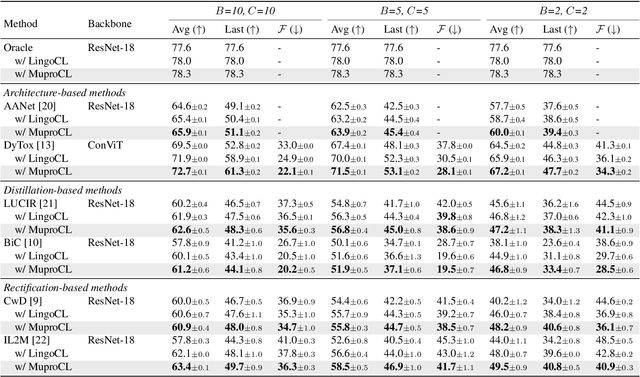
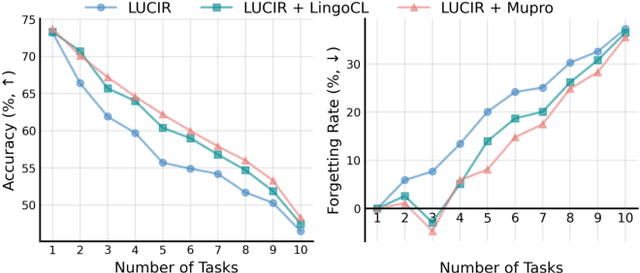
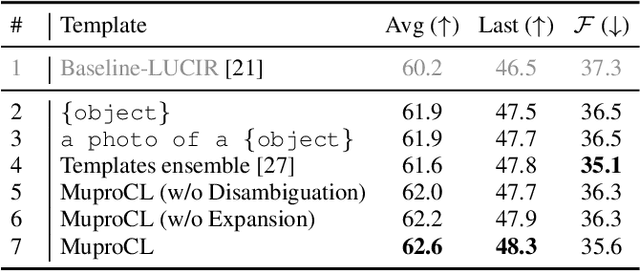
Abstract:Language-guided supervision, which utilizes a frozen semantic target from a Pretrained Language Model (PLM), has emerged as a promising paradigm for visual Continual Learning (CL). However, relying on a single target introduces two critical limitations: 1) semantic ambiguity, where a polysemous category name results in conflicting visual representations, and 2) intra-class visual diversity, where a single prototype fails to capture the rich variety of visual appearances within a class. To this end, we propose MuproCL, a novel framework that replaces the single target with multiple, context-aware prototypes. Specifically, we employ a lightweight LLM agent to perform category disambiguation and visual-modal expansion to generate a robust set of semantic prototypes. A LogSumExp aggregation mechanism allows the vision model to adaptively align with the most relevant prototype for a given image. Extensive experiments across various CL baselines demonstrate that MuproCL consistently enhances performance and robustness, establishing a more effective path for language-guided continual learning.
EC-LDA : Label Distribution Inference Attack against Federated Graph Learning with Embedding Compression
May 21, 2025Abstract:Graph Neural Networks (GNNs) have been widely used for graph analysis. Federated Graph Learning (FGL) is an emerging learning framework to collaboratively train graph data from various clients. However, since clients are required to upload model parameters to the server in each round, this provides the server with an opportunity to infer each client's data privacy. In this paper, we focus on label distribution attacks(LDAs) that aim to infer the label distributions of the clients' local data. We take the first step to attack client's label distributions in FGL. Firstly, we observe that the effectiveness of LDA is closely related to the variance of node embeddings in GNNs. Next, we analyze the relation between them and we propose a new attack named EC-LDA, which significantly improves the attack effectiveness by compressing node embeddings. Thirdly, extensive experiments on node classification and link prediction tasks across six widely used graph datasets show that EC-LDA outperforms the SOTA LDAs. For example, EC-LDA attains optimal values under both Cos-sim and JS-div evaluation metrics in the CoraFull and LastFM datasets. Finally, we explore the robustness of EC-LDA under differential privacy protection.
CBNN: 3-Party Secure Framework for Customized Binary Neural Networks Inference
Dec 21, 2024



Abstract:Binarized Neural Networks (BNN) offer efficient implementations for machine learning tasks and facilitate Privacy-Preserving Machine Learning (PPML) by simplifying operations with binary values. Nevertheless, challenges persist in terms of communication and accuracy in their application scenarios. In this work, we introduce CBNN, a three-party secure computation framework tailored for efficient BNN inference. Leveraging knowledge distillation and separable convolutions, CBNN transforms standard BNNs into MPC-friendly customized BNNs, maintaining high utility. It performs secure inference using optimized protocols for basic operations. Specifically, CBNN enhances linear operations with replicated secret sharing and MPC-friendly convolutions, while introducing a novel secure activation function to optimize non-linear operations. We demonstrate the effectiveness of CBNN by transforming and securely implementing several typical BNN models. Experimental results indicate that CBNN maintains impressive performance even after customized binarization and security measures
Single-cell Curriculum Learning-based Deep Graph Embedding Clustering
Aug 20, 2024



Abstract:The swift advancement of single-cell RNA sequencing (scRNA-seq) technologies enables the investigation of cellular-level tissue heterogeneity. Cell annotation significantly contributes to the extensive downstream analysis of scRNA-seq data. However, The analysis of scRNA-seq for biological inference presents challenges owing to its intricate and indeterminate data distribution, characterized by a substantial volume and a high frequency of dropout events. Furthermore, the quality of training samples varies greatly, and the performance of the popular scRNA-seq data clustering solution GNN could be harmed by two types of low-quality training nodes: 1) nodes on the boundary; 2) nodes that contribute little additional information to the graph. To address these problems, we propose a single-cell curriculum learning-based deep graph embedding clustering (scCLG). We first propose a Chebyshev graph convolutional autoencoder with multi-decoder (ChebAE) that combines three optimization objectives corresponding to three decoders, including topology reconstruction loss of cell graphs, zero-inflated negative binomial (ZINB) loss, and clustering loss, to learn cell-cell topology representation. Meanwhile, we employ a selective training strategy to train GNN based on the features and entropy of nodes and prune the difficult nodes based on the difficulty scores to keep the high-quality graph. Empirical results on a variety of gene expression datasets show that our model outperforms state-of-the-art methods.
DP-DCAN: Differentially Private Deep Contrastive Autoencoder Network for Single-cell Clustering
Nov 06, 2023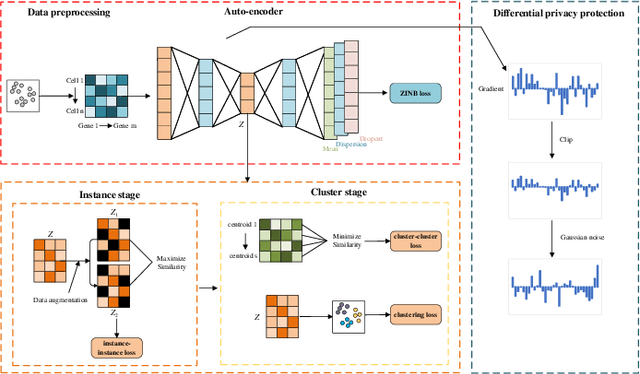
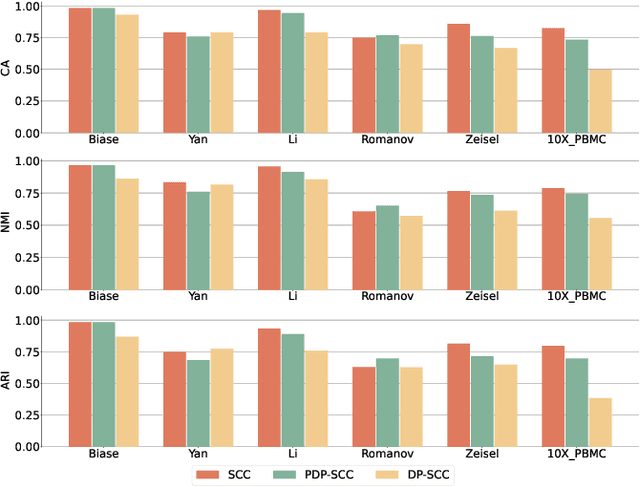
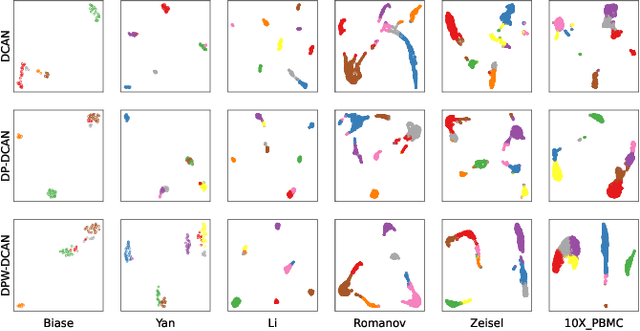

Abstract:Single-cell RNA sequencing (scRNA-seq) is important to transcriptomic analysis of gene expression. Recently, deep learning has facilitated the analysis of high-dimensional single-cell data. Unfortunately, deep learning models may leak sensitive information about users. As a result, Differential Privacy (DP) is increasingly used to protect privacy. However, existing DP methods usually perturb whole neural networks to achieve differential privacy, and hence result in great performance overheads. To address this challenge, in this paper, we take advantage of the uniqueness of the autoencoder that it outputs only the dimension-reduced vector in the middle of the network, and design a Differentially Private Deep Contrastive Autoencoder Network (DP-DCAN) by partial network perturbation for single-cell clustering. Since only partial network is added with noise, the performance improvement is obvious and twofold: one part of network is trained with less noise due to a bigger privacy budget, and the other part is trained without any noise. Experimental results of six datasets have verified that DP-DCAN is superior to the traditional DP scheme with whole network perturbation. Moreover, DP-DCAN demonstrates strong robustness to adversarial attacks. The code is available at https://github.com/LFD-byte/DP-DCAN.
 Add to Chrome
Add to Chrome Add to Firefox
Add to Firefox Add to Edge
Add to Edge